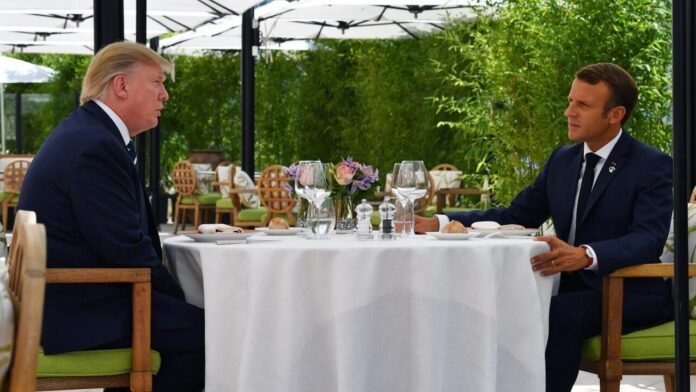Trump criticizes Macron G7 but was the French president’s move a misstep or a bold bid for peace?
Emmanuel Macron’s push for diplomacy at the Canadian G7 summit has backfired — at least in the eyes of former U.S. President Donald Trump, who abruptly left the summit and publicly rebuked the French leader. Macron, however, insists his actions were rooted in urgency and leadership amid escalating violence in the Middle East.
Macron’s statement sparks controversy
Following Trump’s unannounced departure from the G7 dinner in Kananaskis, Macron took the initiative to brief the press, suggesting the U.S. leader had returned to Washington to broker a ceasefire between Israel and Iran. For Macron, such a move would have represented a breakthrough moment at a time when over 220 Iranians and 24 Israelis have already died in recent airstrikes.
But within hours, Trump took to Truth Social to slam the announcement:
“President Emmanuel Macron, of France, publicity‑seeking, incorrectly said I left the G7 summit in Canada to return to Washington to work on a ‘cease‑fire’ between Israel and Iran. Wrong! He has no idea why I’m heading back… Emmanuel is always wrong.”
Trump’s blunt language and public rebuttal triggered further diplomatic tension, casting a shadow over the summit’s closing hours.
Macron’s allies defend his move
Sources within the French delegation say Macron’s comment was based on credible signals from the American side and that the intent was not to speak for Trump, but to highlight momentum toward diplomacy.
“It’s not about claiming credit, it’s about preventing catastrophe,” said one advisor. Macron’s approach, they argue, reflects France’s broader commitment to multilateral crisis management, a sharp contrast to Trump’s transactional and often unilateral instincts.
A G7 at odds with itself
The Canadian G7 was already marked by deep internal divisions. Trump reportedly complained that the summit was “too European” in structure and wanted to expand it diluting European influence. This sentiment aligns with his past desire to reshape international forums to reduce what he sees as elite consensus-building that limits U.S. freedom of action.
One EU diplomat noted: “He wants less Europe, fewer constraints, and more space to dominate the agenda solo.”
Tensions over Ukraine and oil sanctions
Differences were especially sharp on Ukraine. While European leaders presented their 18th sanctions package against Russia — lowering the oil price cap to $45 and targeting the “ghost fleet” circumventing sanctions Trump showed little enthusiasm. “He was on another planet,” a diplomat said, indicating little interest in maintaining pressure on Moscow.
The divergence suggests that if Trump returns to power, Europe may find itself increasingly alone in countering Russian aggression.
G7 statement masks deeper discord
Despite these rifts, the G7 managed to issue a joint declaration reaffirming support for Israel, condemning Iran, and rejecting its nuclear ambitions. But the carefully vague language calling for “broader de-escalation” highlights the diplomatic tightrope leaders are walking.
Notably, there was no direct endorsement of a ceasefire, contradicting Macron’s earlier statement. Trump, meanwhile, escalated rhetoric by urging civilians to evacuate Tehran, signaling an intent to intensify pressure rather than de-escalate.
Whether Macron’s words were premature or visionary, they reflect a fundamental divide in how Western leaders approach diplomacy. In the face of urgent global crises, is bold speech a liability or a necessity?



